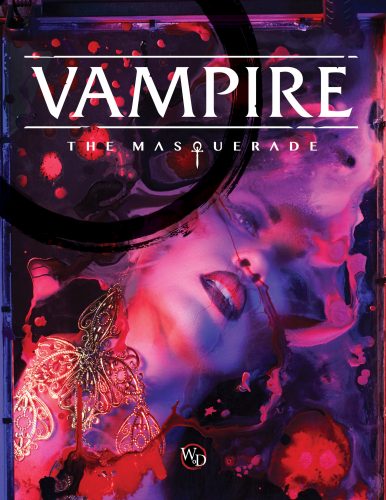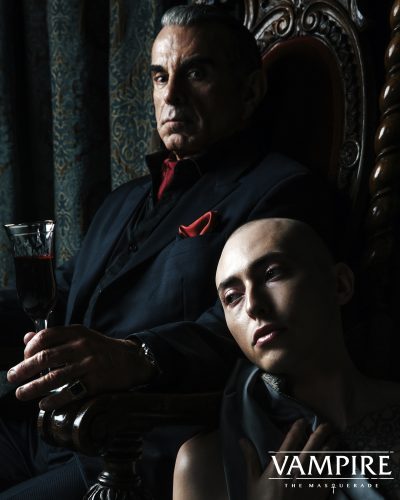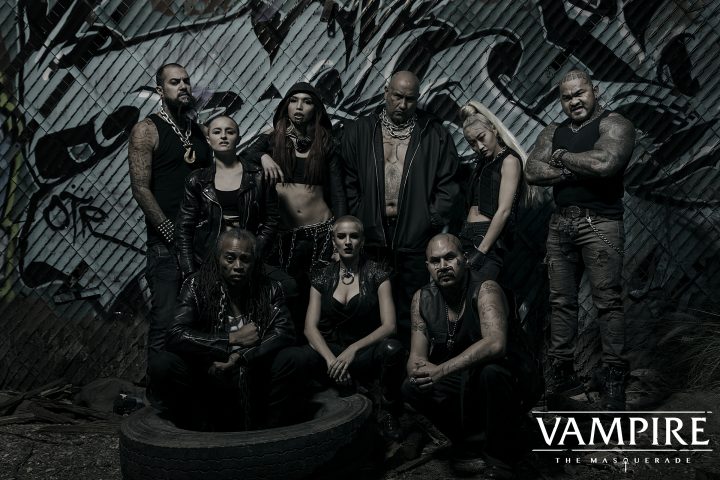“I’ll continue writing and developing Vampire books until someone drives a stake through me.”
(Matthew Dawkins describing his dedication to Vampire: The Masquerade)
Anyone who has taken the time to read writing credits will notice that Matthew Dawkins frequently crops up in Vampire sourcebooks. Matthew is a freelance writer and book developer for Onyx Path Publishing. As well as the World of Darkness Line Developer, he has also been involved with White Wolf as a writer and community director.
Needless to say, he knows his Vampire. So, it should be of no surprise to learn that Matthew is also known for his Gentleman’s Guide to Vampires series on YouTube. This is not a mere fan service, extolling the virtues of his favourite game, but an excellent series of concise discussions on various aspect of Vampire: The Masquerade and its extended metaplot.
Following the release of the fifth edition of Vampire: The Masquerade, otherwise known as V5 (reviewed here) released last month at GenCon, Dawkins took the time to speak with Peter Ray Allison about Vampire: The Masquerade and how it has risen from the dead, like its namesake.
What was it about Vampire that made it have such an impact?
Vampire was a game that spoke to a section of society largely unexplored by roleplaying games. The stereotypical way we view a lot of D&D players in the late ’80s and early ’90s was unfair, but that view was still largely in force at a time when RPGs weren’t seen as “cool” or “mature”. Then along comes Vampire, a horror game in which you get to play the monsters, struggling with maintaining your hidden life from your loved ones, friends, and workmates.
A game with a topic like this – much as with movies that came out around this time about outsiders living in an outsider culture – struck a nerve with a lot of young people, but older roleplayers too, who wanted to play a game with mature elements that spoke to their personal experiences. That, and it was frankly just exciting to play vampires in a modern, gloomy setting.
How do you think Vampire: The Masquerade influenced the gaming culture?
Vampire influenced gaming culture massively. This is most visible in the field of live action roleplay, where players would dress as their characters, play them in bars and other venues, and live a little as their vampire of choice. Live action wasn’t new, but a world where you could play as gothic, tragic monsters was.
Vampire helped lay the groundwork for serious gaming with serious topics. It was one of those important games of the 1990s to show gaming didn’t just have to be wading into a dungeon and hacking up goblins, not that there’s anything wrong with that. Vampire wasn’t the first game to play with horror, or to encourage tragedy in roleplay stories (just like at Call of Cthulhu or even the Nightlife RPG, both of which predate Vampire), but perhaps it was the first to normalise it.
Was Vampire: The Masquerade the first game where you played the monster?
The ability to play the “bad guy” or “bad girl” was an incredibly appealing prospect for Vampire, but what it offered was context. Vampire’s expanding metaplot, the richness of the clans, each of which possessed a distinct character, and the feel of a vibrant, dangerous world, helped lock players in. Playing a monster was the bait, but the game’s depth was the hook.
Why has Vampire: The Masquerade remained so popular despite being replaced by Vampire: The Requiem?
Vampire: The Masquerade came to a natural conclusion in the early ’00s with books increasingly leading to the Gehenna (apocalyptic) event. There was only so long Gehenna could be teased without conclusion, and White Wolf of the time needed to take a new direction.
With Masquerade wrapped up, they embarked upon Requiem, which was a huge success sales-wise and is enjoying a popular, improved second edition published by Onyx Path. However, like the vampires they loved, Masquerade fans didn’t just die. Some moved on to Requiem, others continued playing Masquerade.
Do you think that Vampire: The Masquerade influenced films like Blade, Underworld and Twilight?
Blade as a character existed before Masquerade, but the movies came out subsequent to the game, and I think the connections between Masquerade and the modern Blade media is pretty apparent to see.
It’s de rigeur to dismiss Twilight as teenage angsty drama, a Dawson’s Creek with vampires. But here’s the thing: the Twilight Saga is immensely popular. It deals with some mature topics, albeit in ways you wouldn’t commonly see in a Vampire game. Did Masquerade influence Twilight? Perhaps peripherally, in the sense that Masquerade helped make vampires sexy and modern.
But should Twilight affect Masquerade? We’re not going to see “sparkling vampires” but we would be foolish not to look at what makes a series of books and movies like Twilight popular and see if we can appeal to any of the same audience.
 What gaming mechanics have you seen stem from Vampire: The Masquerade?
What gaming mechanics have you seen stem from Vampire: The Masquerade?
The dice pool system has travelled far and wide since Vampire: The Masquerade’s initial release. We shouldn’t try and take all the credit for that of course, given Shadowrun has dice pools of six-sided dice before we or Ars Magica entered the arena with our ten-siders. The idea of characters being divided between clans instead of classes is something that also moved into other games.
I do know the factions in that D&D setting were directly inspired by the clans in Vampire. Likewise, look to other games where family, lineage, and guild are more important than profession and match the similarities with Vampire.
Are there any particular systems/themes that you feel are quintessentially Vampire: The Masquerade?
In terms of Vampire: The Masquerade of old, one of my favourite parts is the concept of Generation. How far removed from Caine – the first vampire – is your character? It’s a simple system that governs blood expenditure, the amount of power you can wield, and the respect other vampires give you. It’s also a fine character-building tool, as naming ancestors helps a Storyteller come up with plots and justify dots on your character sheet.
As for fifth edition, I lean toward Hunger. Where once a blood pool quantified how much blood a vampire possessed in their system, Hunger is now a constant threat, with a hunger die being added to every roll made in the game. Theoretically, at any point a vampire may now feel the pangs of Hunger and want to feed. They can suppress this or indulge. This, to me, gets to the root of what makes playing a vampire exciting.
What were your influences when creating material for this new edition of Vampire: The Masquerade?
My main influences are the previous editions of Vampire, the dystopian works of authors like J.G. Ballard and Will Self, true crime, and excellent movies like Byzantium. What We Do In The Shadows is also a fantastic Vampire movie, which while not necessarily hitting the typical Masquerade horror beats, definitely speaks to how a house-sharing coterie act.
Where do you go from here?
My priority for Vampire right now is Chicago by Night, which Onyx Path will be running a Kickstarter for later in 2018. Chicago will be the first city sourcebook for this new edition, and I intend for it to become the template for future city books. We want to make it definitive and distinct.
I know Werewolf is in its planning stages, so I would be surprised if the other games such as Wraith, Changeling, Mage and Demon didn’t follow in years to come.
Matthew Dawkins, thank you very much.




